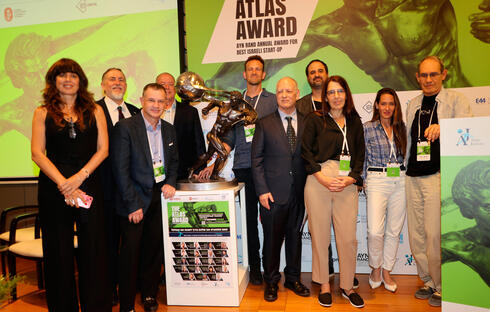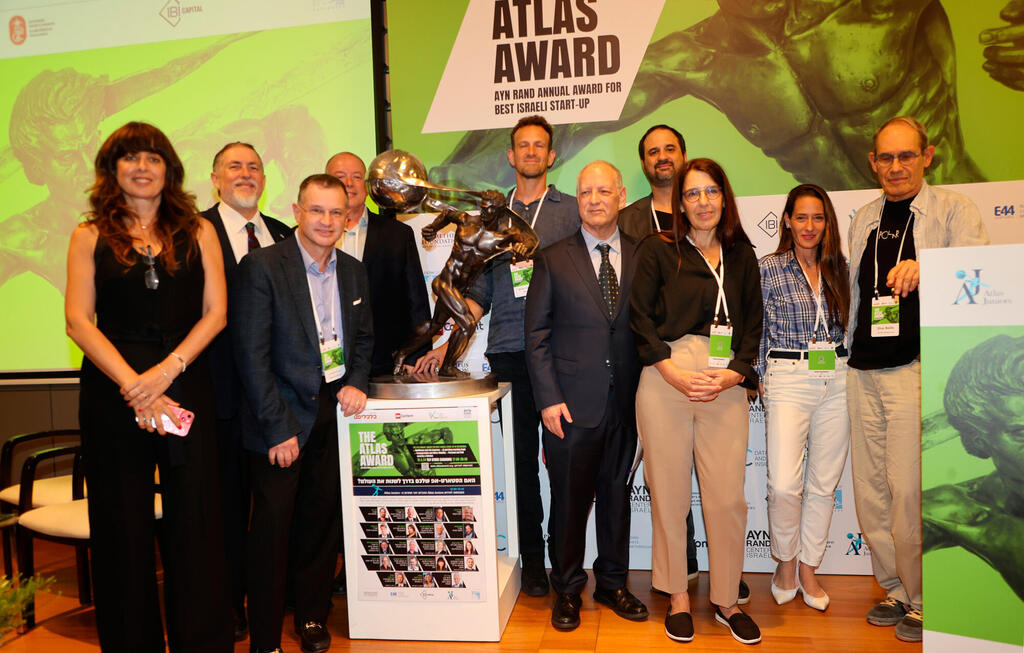
Atlas Awards: Robot and drone operating system developer XTEND wins big prize
XTEND, founded in 2018 by Aviv and Matteo Shapira, Rubi Liani and Adir Tubi, developed a system that allows robots to be used in complex field missions instead of endangering soldiers; The winner in the innovation category: ForSight Robotics, which developed a robotic platform for eye surgery. Other winners: Immunai in the health category, AI21 in the artificial intelligence category, Claroty in industrial innovation and Optibus in the field of transportation
XTEND was the big winner at the Atlas 2024 awards ceremony held Wednesday at the Tel Aviv Stock Exchange. The Atlas Award is given annually by the Ayn Rand Center to Israeli companies that create an idea, technology or product that has exceptional value. The Atlas awards have been given since 2016 in several fields: health and life sciences, artificial intelligence and deep learning, industrial innovation, transportation and micro-transportation, and personal security, civil security and defense. This year another category was added to the competition: innovation.
ForSight won the innovation category. The company was founded in 2020 by Prof. Moshe Shoham, Dr. Daniel Glozman and Doctor Yossi Nathan, and has raised around $70 million to date. The award was given to the company for the development of the "Or Yom" (daylight) medical robotics system. The system is the first of its kind for eye surgery and the first to perform a successful robotic cataract surgery (in an experiment conducted on animals). ForSight has already performed over 150 successful robotic cataract surgeries with the system.
1 View gallery


Shai Beilis (from right), Anat Avni-Papo, Sharon Shacham, Tal Dori, Boaz Arad, Matteo Shapira, Gil Hod, Michael Kauffman, Moshik Kovarsky, and Dr. Michal Vakrat Wolkin..
(Photo: Yariv Katz)
According to Dr. Daniel Glozman, the company's CEO: "Today, more than a billion people suffer from visual impairments that can be treated medically, but due to a global shortage of eye surgeons, surgery is not available to the hundreds of millions who suffer from the impairments. ForSight Robotics' system bridges this gap, and brings a global solution to the shortage of doctors that will improve the quality of life of those in need."
ForSight’s robotic system includes advanced technologies of miniaturized robotics, artificial intelligence, computer vision, and advanced imaging, and is expected to increase the level of precision and performance of surgeons worldwide.
XTEND, which as mentioned won the grand prize of the competition and also claimed the category of personal security, civil security and defense, was founded in 2018 by Aviv and Matteo Shapira, Rubi Liani and Adir Tubi. It has raised about $65 million to date.
XTEND received the award following the development of an operating system that combines artificial intelligence and human intelligence and enables the operation of robots that are able to perform complex field tasks instead of endangering the lives of soldiers.
According to Matteo Shapira, co-founder of the company, "the big change we see is that today there is a fear that artificial intelligence will usurp our place, but at XTEND humans are at the center. Our systems combine machine intelligence and human intelligence."
Immunai won the health category. The company was founded in 2018 by Noam Solomon, who serves as CEO, and Luis Voloch. The co-founders are: Danny Wells, Ansu Satpathy and Dan Littman. The company has raised about $295 million dollars so far. The company has created a huge database of immune system cells, among the largest in the world, which enables mapping of the system in sick and healthy people and the creation of recommendations to improve and shorten drug development processes.
Immunai received the award following a collaboration with the pharmaceutical giant AstraZeneca to assist in decision-making in the process of developing a new biological drug for cancer. According to Noam Solomon, "The immune system is involved in every state of illness and health, responsible for the way we react to drugs and aging. When we crack the code of the immune system, we will be able to develop drugs in a better way, and also maintain people's health in an optimal way."
In the field of artificial intelligence and Deep Learning, AI21 was named as the winner. The company was founded in 2017 by Prof. Amnon Shashua, Prof. Yoav Shoham and Ori Goshen. Prof. Shoham serves as joint CEO alongside Goshen. AI21 has raised $336 million to date.
AI21 specializes in building reliable and advanced language models alongside artificial intelligence systems that empower businesses and professionals. Unlike many of its competitors, the company offers, among other things, task-specific language models (TSMs), which reduce implementation costs, increase efficiency and save time, while maintaining reliability and accuracy.
The company received the award following the launch of a revolutionary language model called Jamba that established AI21 as the first company to implement the innovative Mamba architecture in a commercial-sized language model. The world's leading technology corporations such as Google, Nvidia and Intel have invested in the company.
According to Sharon Argov, the company's VP of Marketing: "AI21 is one of the five leading companies in the world in its field. We insist on staying in Israel, we insist that our core stay here, it is a great pride to be part of such an impressive company."
Claroty won in the field of industrial innovation. The company was founded in 2015 by Benny Porat, Amir Zilberstein and Galina Antova. Yaniv Vardi serves as the CEO of the company. It has raised about $700 million so far.
Claroty enables organizations around the world to secure cyber-physical systems, and enables a secure connection between the cyber world and the physical world in a variety of industries: in the industrial environment (OT), in the health sector (IoMT) and in the corporate sector (IoT), which together constitute the extended Internet of things (XIoT).
Claroty provides one unified platform for the security of the organization's systems (one stop shop) which integrates with existing infrastructures in organizations and provides a complete range of solutions and secure remote access.
The company received the award after surpassing the $100 million mark in annual recurring revenue in 2023 and building strategic technology partnerships with industry leaders such as CrowdStrike, ServiceNow and AWS. According to Yaniv Vardi, the CEO of the company: "If you think about different industries today, you can say that they are under attack. For example, hospitals in the U.S. have security breaches and our goal is to protect the companies. We must make sure that these companies can continue to provide us with life-saving services."
Optibus was selected as the winner in the field of transportation. The company was founded in 2014 by Amos Haggiag, who serves as CEO, and Eitan Yanovsky. So far, the company has raised approximately $260 million. Optibus specializes in developing uniform software for optimizing public transportation services, from planning optimal transportation routes to verifying the reliability of arrival times of public transportation. The achievement for which the company received the award is reaching a value of one billion dollars.
According to Haggiag, "Hundreds of millions use public transportation every day and we manage it better. With our systems arrival times are getting shorter, air pollution is going down and the cities are getting cleaner."
"This year's competition was particularly tough," said Moshik Kovarsky, chairman of the judging committee. "One hundred and seven companies met the strict criteria, and after examining their quantitative and qualitative data, 17 companies advanced to the final stage, where the judging committee met with the companies and learned about the opportunities and challenges they face.
"The dominant factor this year was the AI technology that almost all companies use to upgrade their products, including the winner, XTEND. In the distinguished category of AI and deep learning, we looked for companies that create infrastructure and tools for developing and improving models. The company selected in this category, AI21, is a prominent example of success in this field."













